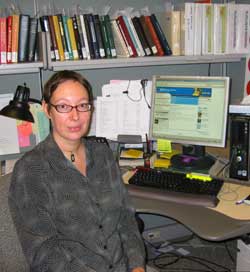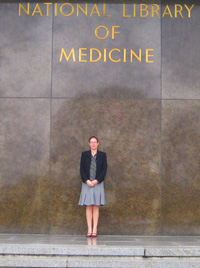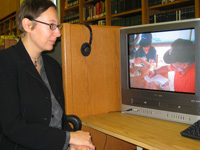 |
 |

|
|
Manon Parry, M.A., M.Sc., Associate Curator, National Library of Medicine,
National Institutes of Health, Bethesda, Maryland
|
1. I chose this career becasue...
2. My typical workday involves...
3. What I like best and least about my work...
4. My career goals are...
5. When I'm not working, I like to...
|
|
1. I chose this career becasue...
|
Back to Top

|

|
|
Manon standing at the entrance of the National Library of Medicine in Bethesda, Maryland.
|
I chose to become a curator because I found the work fun and rewarding. Actually, it was a “happy accident.” While working toward my Ph.D., I wanted to find a summer research project. A university friend suggested I contact the curator at the National Library of Medicine (NLM). They needed someone to work on the new exhibit - “Changing the Face of Medicine.” My education and research experience were a perfect fit for the job, and so I joined the NLM team. It was supposed to be temporary, but I enjoyed the project so much, I decided to stay.
“Changing the Face of Medicine” spans 150 years and explores the lives and achievements of over 300 women who have trained as physicians in America since the 1850s. After 2 years of preparation, the exhibition will open in September 2003 (It closes in March 2005). It will include films and interviews, historical artifacts, activities, a textiles exhibit, and a searchable database of everyone featured in the show. You can find out more at http://www.nlm.nih.gov/exhibition/changingthefaceofmedicine/trailer/index.html.
Education
- Bachelor of Arts Honors, American Studies, University of Sheffield, England
- Master of Arts, Women’s Studies, University of York, England
- MSc, The History of Science, Technology, and Medicine, University of Manchester, England
For my American Studies degree, I was required to study for 1 year in the United States. I studied American history, literature, and politics at the University of California, San Diego. I loved the country and wanted to come back here. I returned after getting my master’s degrees to study for a Ph.D. at Johns Hopkins University in the history of medicine. I found the exhibition work much more rewarding though, so have put my studies on hold.
Flexible Education
What I like most about the degree programs I chose is their flexibility. For example,
the Women’s Studies program focuses on gender, but you can chose topics from a broad spectrum of possibilities—religion, health, literature, art, film, etc. I took the course “Medicine and Women,” and this was the first time I learned about health sciences. I had the same flexibility in my American Studies program.
Mentor
I had a wonderful mentor in England. She was an American professor, and she encouraged me to apply for a Ph.D. in the history of medicine. She gave me advice about the schools and explained how the education system works here. It’s much different from England’s. She also wrote letters of reference for me. Now she works at an American university and is still a source of support and good advice.
|
|
2. My typical workday involves...
|
Back to Top

|

|
|
Manon reviews audiovisual resources in the library's collection
|
My typical day depends on which stage of the project I am working on. Generally, my four major tasks are:
- Communicating – with research subjects, their families, or archive resources, to request or retrieve information, and with colleagues on project details, the status of our research, and next tasks.
- Researching – gathering information from archives, databases, people, and other resources to find interesting stories that help tell the themes of the exhibition. May also include acquisition of artifacts, or other display items. It’s a bit like being a detective. More than just collecting information, you often have to find out what happened when not much has survived to tell the story, or when events have been misrepresented. Training as a historian helps you to question everything you read and gives you the skills to find out more.
- Editing – preparing materials for the best presentation to various audiences and in different formats/venues – such as a website, a theatrical performance, or an exhibit. This is the artistic, creative aspect, where you shape the story and try to tell the most important elements in an interesting way.”
- Meeting – with my team once a week to coordinate efforts, and with graphic artists, designers, web developers, and other professionals who help design and plan the physical presentation of the exhibition in the gallery and the virtual exhibit on-line.
|
|
|
 |